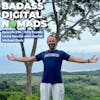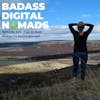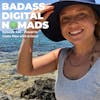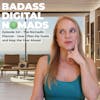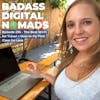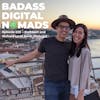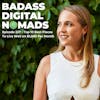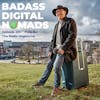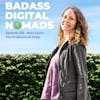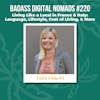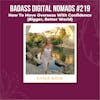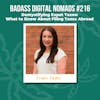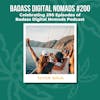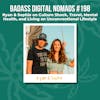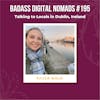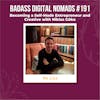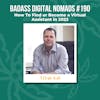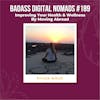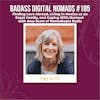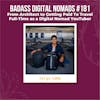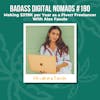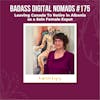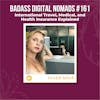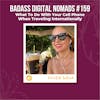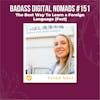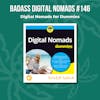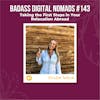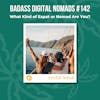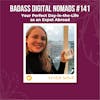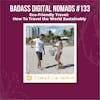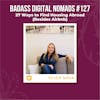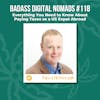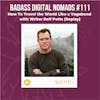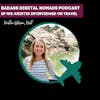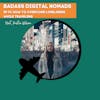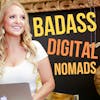How To Find Balance in a Slow Travel Lifestyle While Working For Yourself with Chelsea Riffe
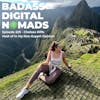
Have you ever struggled with wanting to do "it all" when it comes to travel or living an overseas lifestyle, but feeling like you don't have time (or money) for everything? Listen to Chelsea Riffe share stories from the road, including how she's overcome her struggles to make money online and find balance in an international lifestyle.
Have you ever struggled with wanting to do "it all" when it comes to travel or living an overseas lifestyle, but feeling like you don't have time (or money) for everything? Do you want to quit your corporate job but aren't sure what you can do to earn an online income to replace your salary?
Today's guest, Chelsea Riffe, has been there, too. From being "so broke" that she was cleaning houses and scooping gelato in Australia to becoming a successful online business owner, she's been on quite the journey.
Today, she's the host of the "In My Non-Expert Opinion" podcast, which she runs alongside her consulting business while traveling the world full-time as a digital nomad.
In this episode, Chelsea shares her stories from the road, including how she's overcome her struggles to make money online and find balance in an international lifestyle.
SPECIAL OFFERS:
- Try Podia to host your online course or business
- Find a remote job with FlexJobs (use code SAVE30 to save up to 30%)
- Apply to join Ready to Relocate
- Join Kristin's Patreon
Topics Discussed:
- The good, the bad, and the ugly behind the digital nomad lifestyle.
- Starting an online business and podcast + Helpful resources.
- Where to start in making money online.
- Getting the courage to quit your corporate job.
- Chelsea's plan for moving/traveling abroad.
- Tips for finding jobs and accommodations with Australia's Working Holiday Visa.
- Moving/following someone for love.
- Slow Travel.
- Coping with cultural differences and language barriers in Germany.
- Unique challenges of running an online business while traveling.
- Time management tips for digital nomad business owners.
- How to prevent the emotional and financial “whiplash” you experience when traveling quickly.
- Making friends abroad.
Questions Answered:
- What are your favorite resources for starting an online business?
- How do you get the courage to quit your corporate job?
- When did you escape lockdown in Australia and start traveling the world?
- What is your ideal pace of travel?
- What's the hardest part about living in Germany as a Latin American expat?
- What tips do you have for running an online business while traveling full-time as a digital nomad?
- What advice do you have on balancing work, travel, and a relationship with somebody from a different culture?
- What are your top 3 business tools/apps?
- and more!
Episode Resources:
Related Books:
Related Podcasts:
- Leaving Canada To Retire in Albania as a Solo Female Expat with Karen Espig
- How To Make More Money Online With the Host of the Money Magic Podcast
- Planning Your Travel Itinerary and Getting Free Travel Using Credit Card Points
- How To Make Money From a Sailboat With No Experience
- Taking the First Steps in Your Relocation Abroad
- How To Find Your Home and Your Community Abroad (World Towning Part 2)
- How I Make Money Online - My Top 10 Online Income Streams
- How To Become a Digital Nomad (For Dummies)
Related Videos:
- Travel Tips & Hacks
- Culture Shock Playlist
- Why I Love Living Abroad
- What I Hate About Living Abroad
- The Reality of Full-Time Travel
- The Easiest Places for Americans To Move Overseas (VISAS & RESIDENCY)
- 7 Things To Know BEFORE You Move Abroad
- 15 Things I WISH I Knew About Solo Travel
Online Business Resources:
- The Skinny Confidential Him & Her Show
- The Tim Ferriss Show
- The Ed Mylett Podcast
- Notion
- Slack
Podcasting Gear & Software:
Other Digital Nomad Resources:
- Travel with Remote Year
- Join Girls LOVE Travel
- Capital One Venture Card
- Travel AF
Recommended Places to Go in Australia:
- Coogee Beach
- Bronte Beach
- Paddington
Connect with Chelsea:
- Visit her website
- Subscribe to her podcast on Apple or Spotify
- Follow her on Instagram
Connect with Kristin and Support the Show:
Full show notes and the podcast transcript will be up shortly on www.badassdigitalnomads.com. Check back later this week!
Sneak Peek:
Kristin: 00:00:00 Where were you in Germany and what were some of the, uh, cultural differences that you found the hardest to cope with as an American?
Chelsea: 00:00:08 Germans are just very realistic and down to earth and sometimes blunt. And so for example, like my roommate one time he made this burger, and I was like, oh, this is so good. It's like the best burger ever. And he just looked me deadpan in the eye. I was like, it's not the best burger ever. And I was just like, oh, I just meant like it's a compliment. Like it's so good. He goes, yeah, but it's not the best burger ever.
Kristin: 00:00:28 Shut down. <laugh>.
Introduction: Welcome to Badass Digital Nomads, where we're pushing the boundaries of remote work and travel, all while staying grounded with a little bit of old school philosophy, self-development, and business advice from our guests.
Kristin Wilson, Host: 00:00:49 Hey there, Kristin, from Traveling with Kristin here and welcome to episode 229 of Badass Digital Nomads. My guest today is a fellow podcast host named Chelsea Riffe from the US. She has been helping creatives, coaches and entrepreneurs with launching, growing and monetizing their podcasts for years now. And she blends her 10 plus years of digital media content marketing and storytelling expertise into helping her clients. It was great to talk with Chelsea today. She is from Florida, as am I, and she has had quite a roller coaster of a travel experience having studied abroad and then moved abroad to Australia and then getting stuck there during the pandemic, before becoming a full-time, digital nomad traveling the world. And in today's conversation, she is so transparent and so raw and honest about her experience. I know that you guys like hearing the good, the bad and the ugly <laugh>, the the real deal behind travel.
Kristin: 00:02:00 So I think you're really going to like this conversation and also learn a lot from her experiences and also a lot of mistakes to avoid. So thanks to Chelsea for being so honest with us and for sharing her experience. You'll also hear Chelsea talk a lot about her journey to becoming an online business owner and some of the other jobs that she had that were not remote whatsoever when she was learning how to launch her business. And so today on the podcast I wanted to share with you a tool that I love to use that I've been using since 2020 now to help run my online business. And that is Podia. Podia is an affordable website where you can actually build your website, have your email marketing and host all of your products all in one place. So this is for you if you're looking to start a website, build an email list, sell digital products, sell online courses.
Kristin: 00:03:07 It's really an all-in-one online business platform. And I, after doing months of research on different course sites and hosting sites, I ended up going with Podia and I'm so glad I did because it's a really easy site to use. You don't have to be a web developer or know how to code to be able to use it. You can customize your website and then you also have your email marketing and your digital products all under one roof. And this is also what I use for my relocation community, which is called Ready to Relocate. So you can even build your own online community there without having to use Facebook or other social media sites. So I will link to Podia at the top of the show notes where you can try it out. And this will be with our refer a friend link and Chelsea's also gonna share some of her top online business tools at the end of today's episode.
Kristin: 00:04:07 So I hope you enjoy. I also want to thank my longtime subscriber Ann Patron, Karen Esbigg from Canada for her recent five-star review on Apple podcasts. She really loved the Living Like a Local episode that we did with Tuula Rampont who's living in France. And she says, I've been consuming Kristin's content on various platforms for three years now, and was even interviewed myself. This particular episode was super useful with practical advice and I'm now really excited to investigate France as a possible new home. If you're not a supporter of Kristin on Patreon, consider signing up. Thanks, Kristin, and Thank you so much, Karen. It's, it's so great to receive reviews, but it's also very special to receive reviews from people who have been subscribed for a really long time, who have listened to so many podcast episodes and watch so many videos and are also there every month hanging out with me over on Patreon.
Kristin: 00:05:12 And so you can join us on Patreon. It's only $5 per month and it's just a really cool community over there at patreon.com/travelingwithKristin where I share a lot of things that I'm working on behind the scenes, some previews of videos that are going out on YouTube, and also we do some special live streams over there. So definitely encourage you to sign up, and thanks again Karen for the five-star review. We are still two reviews away from 200 ratings on Apple Podcasts. So if you're an Apple Podcast listener, you can be one of our next two reviews to hit the big number of 200. So really appreciate your support and enjoy my conversation with podcast guru Chelsea Riffe.
Podcast Interview:
Kristin: Well welcome Chelsea to Badass Digital Nomads. It's so great to have you on the show. And it's so funny that we're so close together right now.
Chelsea: 00:06:11 I know it's like so close, but so far, yeah.
Kristin: 00:06:13 How so how far are you from Manchester at the moment?
Chelsea: 00:06:17 I'm about an hour train ride, give or take.
Kristin: 00:06:19 Okay. And before we get into, you know, what brought you here to England, give us a bit a little summary of who you are and what you do because you have been on a whirlwind remote working trip around the world lately, so give us some insight into your background.
Chelsea: 00:06:37 Yeah, absolutely. So right now what I do is I help people launch podcasts or grow them or monetize them. So funny enough, here we are on a podcast and that's kind of what I made my career. And I do have my own podcast called In My Non-Expert Opinion. I ran that for about three years just as a creative hobby. And then when the pandemic hit, I started my own business. It was actually more like life and mindset coaching. And then I quickly realized that it was a very emotionally draining job. And I was like, I feel like I have other skill sets from working in corporate America from my master's degree from my undergrad that I feel like I could teach people. And I put some feelers out there about podcasting and it turns out a lot of people wanted to start a podcast and just didn't know how or have the skillset or the tools.
Chelsea: 00:07:20 So I was like, all right, let me see if I can help them. And that's what I ended up pivoting to was completely podcast coaching. And I did this all while I was traveling. So like you said, I've been on a very whirlwind remote working journey in the last year, but it didn't start like that. I actually quit my job in 2019. I worked in influencer and content marketing, software sales and I moved to Australia for a year. I ended up not starting my own business, I was just kind of doing whatever I wanted. Weird, odd jobs making ends meet, like scooping gelato and working at a yoga studio and teaching yoga privately online and working at social media for a music agency. It was a bunch of different jobs. And then eventually when again the pandemic hit, that's when I started my business. So that took me to Germany, which with my German ex, I was in lockdown for a whole year there. And then we broke up, I went on a Euro trip for like five weeks, moved home to Florida for about a year to just stay with my parents and then went on the chaotic whirlwind journey that I've been on the last like year and a half
Kristin: 00:08:21 <laugh>. Well I'm glad you shared that because it is, so often when people have podcasts or they are entrepreneurs, they can look like an overnight success because by the time that people find out about them, it's after putting in a lot of years of hard work. So I'm glad that you mentioned some of the things that you've done in the past like teaching yoga and scooping gelato because I'm always telling people that are asking me about how they can find a remote job or what they can do to make money online. I'm like, start with the skills that you have because you learn so many skills doing anything that you do. And I used to teach surf lessons, I worked in retail, I waited tables. I mean each of these jobs, even if it's not a remote job, it it gives you interpersonal skills working in retail, I was going to expos and learning how to order products, and you know, you, you just learned so many skills. So what was it that you were studying originally that led you to get your master's degree, and what was the path that you were on before you pivoted <laugh> and ended up uh, doing what you're doing today?
Chelsea: 00:09:29 I really wanted to be an ESP–ESPN sports reporter. So Aaron Andrews and Samantha Ponder were like my idols and I,
Kristin: 00:09:36 I can see you doing that <laugh>. You have the voice, you have the look, you could do it <laugh>.
Chelsea: 00:09:41 I know my dad is still like, he's like, I'm waiting, I'm just waiting to see you on my football, you know, Sunday football screen. I'm like maybe one day. But yeah, I really wanted to do that. And then I took a bunch of classes in my undergrad to be able to do that. I was interning at local news stations, I was shadowing people at ESPN. I even took a hosting and reporting class in a very specific field that was just for, it was reporting on the athletics at FSU. And so I was dead set on that. And then I had all these mentors tell me right before I graduated like, I don't think you wanna do that. It's very competitive, it's very cutthroat, you don't make a lot of money. You have to start very, very low on the ladder and live in the middle of nowhere.
Chelsea: 00:10:22 And they were basically just saying if you want a family or freedom in the future, this is really hard because you very much have to cut your teeth in this industry. And I was like, oh, I feel like that's kind of bad advice. Like, let me just figure it out myself. And I fortunately had a few women ahead of me that had done it, like they had graduated earlier than me and I was like, Hey, how's it going? Da da da. And both of them were like, it's a lot of work. It's a lot of work. I'm not getting paid. Well, one of my friends said she could qualify for welfare and she was working in Alabama, which the sports industry there is massive, right? Alabama always wins a football, uh, college football games, they have so many incredible sports teams. So to know that she was in that market and struggling, that really opened my eyes to like, is that something I really wanna pursue?
Chelsea: 00:11:08 Living in the middle of nowhere, working 80-hour weeks and not really getting good stories. And I do know you have to prove yourself and work your way up, but this is when digital media really started taking off. And I was like, maybe I could do something with sports but my own, you know, I could make it a YouTube channel or be an online video creator or something. So then that's what prompted me to start looking into master's programs. And then I found out there was one at Loyola Chicago called the Masters of Digital Media and Storytelling. I'm like, that's perfect. And it was how to tell stories through video, through audio, through writing, through analytics, like any way you could tell a story online. And I did that for two years and then that eventually led me to the job that I had in corporate America, which was in influencer and content marketing, which then gave me all the knowledge and skills to do what I'm doing today.
Kristin: 00:11:55 At what point did you feel like you had the courage to, you know, quit your corporate job and do something yourself?
Chelsea: 00:12:03 I think it was truly two things that stood out to me were I realized that the time off at my corporate job, it was what it was, right? You had your set amount of PTO days, your bank holidays and that was it. And you're almost waiting for this weird magical moment of like when you were in elementary school, and you got two or three months off in the summer and then a week long summer break and then a week long winter break, and you know these breaks that you get. I'm like, that doesn't exist in corporate America. And I remember banking all my PTO one summer to go do a Euro trip and it was so chaotic 'cause we were only there for 10 days. So we did like three days in Budapest, three days in Berlin, three days in London in huge cities. And it was just so exhausting.
Chelsea: 00:12:44 And that started to really open my eyes to the fact of like, that's going to be your life, right? That is how you're gonna have to travel. Because I had the travel bug way earlier from studying abroad. And so that, yeah, that started to hit me of like, is this really how you're gonna spend your future? Like just banking all your PTO days and taking 10 to 14 days off and then just waiting until another summer. And that started to weigh on me a lot. And the second thing was, I remember the campaigns I was working on were so incredible. I mean, I was working with some of the world's biggest media agencies and brands on campaigns for like M and MSM and Yahoo Sports and Dell and I got to go to New York and meet all these different brands and agencies and there was one particular meeting with the media agency and I remember being like, oh we crushed this campaign.
Chelsea: 00:13:30 We did so well. The photos were amazing. The comments like everything just blew it out of the water. And the media agency was just like so rude to me. And they're like, have you seen the campaign? Like, like scoffing their nose? And I want to tell you that the campaign was so good that my company was using the images on our marketing materials because of how high quality the content was. So to hear this media agency tell us like how bad it was, and they thought it was gonna do better when we had blown the goals out of the water on all fronts, that's when I started realizing like I am working my butt off to make these people happy. Creating really great content like having the influencers and content creators guide them and then to be told to your face it basically sucks. And, you know, roll their eyes at it.
Chelsea: 00:14:15 I was like, I'm not dealing with this anymore. Like, I have the skillset to be able to create my own thing. By the way, I'm not saving lives. Like we're talking about snack brands, right? Like <laugh>, we're talking about content creation for a snack. And I was just like, this is so silly. And I was able to zoom out and just be like, yeah, is this how you want the rest of your life to look? Is begging for approval from these Fortune 100 brands and working again hours and hours a day and getting like no vacation time. I was just like, I'm fed up with this. So it was really a point of like, I'm just done, I'm done with this, I'm done with this lifestyle, I'm done with like people pleasing and that's when it really motivated me to get out of America and try to do my own thing in another country.
Kristin: 00:14:58 That's such an important insight. And being somebody who hasn't really worked that much with the corporate America, the few experiences I've had have been very similar. And you really start to glean the amount of time that people climbing the corporate ladder invest in the politics and the relationships because it's not always or even often about the quality of the work, it's more about who you know and networking. And so that can be extremely frustrating, especially when you're working so hard, you're not getting raises, you're not getting compensated appropriately, and then you're not even getting many benefits or time off, and you're just living for the weekends and living for those, you know, 10 day trips to Europe where the first day you're getting there, the last day you're leaving, you get like eight days really. And this is a timely topic as well because we are in the midst of the permissionless economy and the creator economy.
Kristin: 00:15:55 And I was like, you, I wanted to be on, I wanted to have my own travel show like Brooke Burke on Wild on E but when I started researching, you know, how to break into tv, it's like the breaking into TV, radio, things like that. These are the the reasons why, you know, people talk about starving actors and your parents try to dissuade you from going to film school <laugh> because it, it is really hard to break into those industries. But we live in this time now where you can be your own expert. And I see this around all sports and every topic. It's like, sure you can, you can apply to be the next Food Network star or you can just create your own cooking content and create your own audience and actually get better at SEO and content marketing and content creation than the actual food network because they're doing things the traditional way.
Kristin: 00:16:50 I see this with um, with Formula One, you've got like the main Formula One channel, and then you've got every other person who's commentating on their own YouTube channels and podcasts, and they're blowing up. There's a girl who I was following on YouTube from the very beginning who's talking about accounting and finance and in one year she went from 40,000 subscribers to six, I saw last night she had 650,000 or 680,000 subscribers. And it's like there's your, your answer, you know, you could work your way up the ladder at an accounting firm and try to become a partner or you can just share content with the masses about how to do your finances better and then pull in some $10,000 brand deals and call it a day. So yeah,
Chelsea: 00:17:38 Yeah. And make more money and work your own time, choose the clients you wanna work with and like you said, even partner with the Food Network and have them pay you to create content.
Kristin: 00:17:48 <laugh>. Yeah. And late, and I had an experience around the pandemic where it was like that I spent an entire year interviewing with this company to get this job that was gonna pay nothing to give me this opportunity to travel around and create content. And then I was like, wait a second, that's what I'm already doing. Like I'm glad that, well not glad the pandemic happened but the pandemic ended that opportunity right when it started. And so I had a lot of time to think about it and I was like, you know, I'm just gonna focus on my own community and my own content and then definitely glad that I did. So talk to us a little bit about that interim period because a lot of people are thinking, let's say you're doing your, your one year plan and you think, all right, I wanna quit my job and then within three to six months I wanna start this company and replace my income. Which can be like pretty difficult at the very start, but there can be this interim period where you're just testing the waters of different things and doing multiple jobs to cobble together an income that replaced what you were doing. So you get rid of the golden handcuffs from the corporate job and then did you immediately like take your savings and start traveling and, and start, you know, scooping gelato and things like that? Or what was your plan or did you have no plan?
Chelsea: 00:19:05 My plan was very chaotic. So I was living in Chicago and I knew if I really wanted to save to move abroad, the lifestyle and cost of living in Chicago was just too high to make any type of impact on my savings account. So I moved home to Florida and I got really, really lucky that this couple that lived, I'm not kidding, right next door to my office was like, you could just stay in our guest room for free while you're saving. And I'm like, okay, like do you want me to help with groceries or rent and I, I'll pay like anything? And they're like, no, like we understand you're trying to save so you can just stay with us. And so I worked out a great deal where I got to stay with them for almost six months without paying rent and I put a lot of that money towards savings, and then I lived at home at little a little bit with my parents to save some extra money.
Chelsea: 00:19:50 Now going back to what I did in corporate America, I was in sales and so a lot of my big checks came from commission. This exact client that I was telling you about that was rolling their eyes at the content and dah dah dah. That was one of my biggest deals that I had sold that year. And I was really banking on that money coming in before I quit to be able to really like cushion out my savings and be good. I was trying not not to work for like six months when I got to Australia. So what ended up happening was they didn't pay on time and by the time I left my corporate job I did not see that commission check because of all the rules in place because technically I'm not an employee anymore and you know, I'm not even on their payroll and they, it's so annoying because they paid on a Monday and I left the job the Friday before.
Chelsea: 00:20:33 No. So basically like one more, two more business days, I would've gotten this check and it was a lofty check. It was a four figure check that would've kept me definitely for a longer time in Australia. I will say, looking back instead of being so annoyed with it, it was a bit of a blessing in disguise because it made me, it just, I had to rework my angle of how I was gonna spend my time in Australia and instead of taking like six months off, I could really only take about two or three. And that's what prompted me to be like, okay, now you really have to find a job and this is where I like to say you become like a cat with nine lives. You get very resourceful, and you're like, let me see how I can make money, let me try anything.
Chelsea: 00:21:12 I had done a yoga training actually in Bali. So I was in Australia for about three weeks and then I went to Bali for a yoga training, got back and I'm like, okay, how can I teach yoga right? Let me teach it on the beach. I remember uploading an Airbnb experience to teach yoga. I was trying to figure out if I could do like a course about yoga, teach people privately. It was a lot more work than I thought. I mean it was trying to set up a business in the moment that I didn't realize that I was really doing. And I'm like, well you need money now. Like my savings was quickly running out. I was pretty irresponsible to be honest with my savings. I was like going on trips and going out every day to eat and just really living a lavish lifestyle and that's what prompted me to go get the gelato scooping job. Australia by the way, anyone that wants to move there has a really good visa and really good minimum wage so you can get the working holiday visa and it's pretty instantaneous because they really do need a lot of help from expats and tourists with how much tourism is in Australia.
Chelsea: 00:22:08 So it was pretty easy to find a job. And then the second thing was my minimum hourly rate was like $32 an hour, just really high for just scooping gelato, <laugh>. So that was fine for me. I was like, I get to work what 20 ish hours a week? My rent was really cheap 'cause I had roommates. Yeah, it was just a really easy-breezy job. But I realized again, bigger picture like I couldn't just be living week to week and this was not the bigger picture, right? I did not quit my corporate job to go end up working at a gelato spot <laugh>, no hate to gelato. That just wasn't like the vision for me. So then yeah then I had to start working some odd jobs. I found a better job in terms of like pay, doing social media for a music agency.
Chelsea: 00:22:50 The environment was a bit toxic for me, and I was only there for about three months and then I left. And for anyone that is on the working holiday, uh, Australia visa, you know there's something called your 88 days and your 88 days is when you have to go to a rural part of Australia to get a second year visa and you have to do either farm work or Americans can do hospitality and tourism work. So I knew I wanted to say in Australia another year and I was like, it's time to get that 88 days clocked in so that I'm not running outta time at the end of the year. That's a big mistake people make is they wait till the end, and they don't have enough time to collect those 88 days. So I'm like, you need to get out of Sydney, which is where I was living.
Chelsea: 00:23:29 Go find a this 88 days job and get to work. So I went up to Cairns, which is up north from Sydney and this is right about when the rumblings of the pandemic were happening and I remember being at a hostel and I had worked out an accommodation exchange where I said I'll post on your social media and like run your content for a little bit in in exchange for a place to stay. And they were like, that's fine. So hot tip, if anyone's struggling with finding accommodation, you can always do exchanges. So I stayed at that hostel for maybe three weeks and then that's when the pandemic news really started hitting, and we were like, what is happening? And I just remember I woke up the next day, no one was really taking it seriously because we got the news a bit later than Americans and all my friends were like, are you not seeing the news?
Chelsea: 00:24:12 Like this is a really big deal. And we were like partying at the hostel and playing limbo and swimming in the pool, you know, just doing hostel backpacker things. And I kept getting all these messages from my friends of like what is going on over there? And I don't know, none of us really took it seriously. And then I'm not kidding, the very next morning I woke up, they said 75% of the hostel had checked out or flown home including staff. So we were missing like receptionists, like cleaners, people that ran the kitchen, like people just fled the scene. And that's when I started to be like, whoa, like this is serious. Like you need to get out of here. And so I started looking at flights home and they were $10,000 not even lying like 10,000 to $17,000 that I did not have ready to just buy a flight home.
Chelsea: 00:24:56 So I was like, you need to either wait this out or you need to go to another part of the the country. I didn't really know what to do because it still hadn't hit us like the magnitude of what had happened yet. And just in the nick of time I found a job that was on the west coast of Australia that was the 88 days type of work. So it was in this beautiful town, it's really small called Broome, it's has insane beaches with like red clay type of stuff and crystal clear blue water. And right when I got there I was gonna work at a restaurant. I literally pulled up and they were like, so our restaurant closed down due to this new thing called Covid and so we're not open and so we don't need you to work at the restaurant right now.
Chelsea: 00:25:35 And I'm like, I just flew all the way here. I give up my apartment lease. I literally packed up everything. I mean it's like moving from New York to LA it's the whole other side of the country so far and everything was closed, right? Like I, I couldn't just be like, oh let me go back and fly home. Like the flights were shutting down, everything was chaos. So they said I think we're gonna go do to go orders and we need someone to watch our kids while we do this. So if you want a nanny then you can nanny for our kids while we figure all this out. I was like, that's fine. Like I would love to nanny and do something, especially in exchange for accommodation 'cause I was really running outta money. And then what happened is they ended up living in a, a literal mansion by the beach and they had two guest rooms.
Chelsea: 00:26:14 So I was like this is not a bad place to stay while you're being in lockdown
Kristin: in lockdown <laugh>.
Chelsea: No. I was like, I get to live in a mansion, I get, I don't have to pay rent. I, all I'm doing is watching these cute little kids that are very nice. Like it actually worked out really well. And that was honestly the time that I started to realize the the pandemic is not a two week thing. I think a lot of us thought it was like, I don't know, a flu outbreak that would be gone in two weeks. I think the time kept going and going and I'm like, no, I think you're gonna be stuck here a little bit longer. So that's when I really started to take my time seriously and be like, you have no rent, you don't have any responsibilities here.
Chelsea: 00:26:51 You have no nothing to do, right? Like there's no social life, you're not spending your money doing anything so why don't you invest that money into learning about business? So that's three month period is when I started taking courses online, investing in coaches, investing in any type of mentorship to really understand like online business. And then that's when I started thinking about like okay, this really could be a business. And then it was mindset coaching I started with. So it all happened in the bedroom in that mansion by the beach while I was nannying the whole idea of starting my business. And I will say too, at this point I was so broke, I was cleaning houses for money to be able to buy groceries. I was using my tax refund to invest in coaches and courses and Australia we had kind of like a 401K type of situation there.
Chelsea: 00:27:38 They were letting people take out the money from there without being penalized because of the pandemic. So I took out all the money that I had made from the gelato and social media job and I was investing that into my savings and into programs and coaches. So I was living on very thin ice. Like I did not have a big cushion, I didn't have a loan, I had maxed out my credit cards at this point. So I was actually in pretty dire situation where I was like, you actually have to make this business work or you're gonna have to, I don't know, move home. I, I do have a family that I know would let me just like move home and stay there as long as I needed but that was just not an option for me. So it really was a sink or swim situation where I'm like, you have to get going or you are literally gonna be truly outta money.
Kristin: 00:28:21 That is a crazy story <laugh>, but it just shows that necessity is the mother of invention. Yes. Um, where were you going to figure out, you know, online business is a really big topic, so what were some of the resources you are using to even get started? Any sort of platforms or online courses that you could recommend or coaching programs?
Chelsea: 00:28:42 Yes. So actually there was a woman online called the Six-figure Chick and unfortunately she passed away.
Kristin: 00:28:47 Oh I saw that on Instagram.
Chelsea: 00:28:50 Yeah, her name was Cici and I remember she just said really simple to the point courses of like here's how to create a membership, here's how you develop community, here's how to run a course. And they were very affordable and again just very to the point. So I really loved their content and like I said, I do think the brothers still runs the business. So that's a great resource that I used also, I googled courses on how to run a course <laugh> like that was my Google search and I did find one but unfortunately that person is no longer um, doing what they're doing anymore. And what else? I think I invested at that time I really thought I was gonna do yoga online. I was pretty delusional and I thought I was gonna start an app and a platform and like athleisure wear, like I was just going to the moon with this idea.
Chelsea: 00:29:34 So I was looking a lot into yoga communities of like you know, successful yoga mentorship that I could work on people with one-on-one and I did find a mastermind but again I don't think they actually do that anymore. And to be honest, I think some of the tactics were a bit predatory <laugh> so I don't highly recommend it. But I will say I learned so much just from listening to podcasts as well. I listen to so many podcasts on business and money and charging people what you know, what you're worth. And that was really, really instrumental to me as well.
Kristin: 00:30:02 Which podcast did you listen to?
Chelsea: 00:30:05 So in the beginning of my journey I listened a lot to what's called the Skinny Confidential, him and her and they have a lot of business advice. And then I also listened to like Tim Ferris, I listened to a lot of um, who else? Maybe Ed Mylett at that point. He's very like mindset focused. Um, yeah, I'm kind of blanking 'cause it was in the summer of 2020. But yeah, it was, I just remember spending my days with my eyes glued to my computer to the point where the kid that I was babysitting was like, why are your eyes red? The color of your eyes are red. And I'm like, oh my gosh. Because I was staying up till four in the morning just trying to learn as much as I could about business while I had the time. 'cause I knew it wasn't gonna be forever that we were in lockdown.
Kristin: 00:30:46 Right. That's really inspiring. Oh not the sleep deprivation part, which I have done and sometimes I'm watching my videos and my eyes are bloodshot <laugh>. It's from lack of sleep and too much screen time. So when did you try, you know, the mindset coaching, you thought about doing yoga, how did you go about collecting the market data to get into this podcasting business?
Chelsea: 00:31:10 Yeah, so what was interesting is I had a Facebook group that I started for the yoga stuff. So I thought I was gonna do kind of this like mindset yoga course. And the Facebook group really helped me understand like how to talk to people and ask them questions and do polls and like see what people are thinking of. And I would just market a lot in the Facebook group. And then when I launched my course, let's keep in mind I had had my podcast already for three or four years before that. That was a fun creative hobby. So I started my podcast in 2017,
Kristin: 00:31:41 The my non-expert opinion podcast.
Chelsea: 00:31:43 Yep.
Kristin: 00:31:44 How many episodes now?
Chelsea: 00:31:47 200 over 200, maybe like 206 or seven. Okay. I took a big break because I crashed and burned one year. <laugh>
Kristin: Me too.
Chelsea: But let's talk about that a second. Yeah, <laugh>. Yeah. Um, so what was interesting was I thought the Facebook group was gonna be the big, I don't know, market data research type of thing where I would find all these clients. And what happened is when I launched my first course, all these people started registering that weren't necessarily my Facebook group. And I'm like, where are they coming from? And a lot of them were like, I've been listening to your podcast for years and I didn't know you were gonna start a business, so this is just really cool that now you have a business and I can be part of this. And because my niche at that point wasn't that niche, right?
Chelsea: 00:32:27 It was just like mindset to become your best self. It was speaking to a larger group of people and podcast listeners as I was talking about it on the podcast signed up. So that started to click of like, that was really interesting that I thought three people were gonna sign up for that course and 20 people signed up and majority of them came from listening to the podcast. Wow. So then I started realizing as I was promoting, you know, then I moved to one-on-one and then I had some like group workshops. I kept promoting these things through the podcast and people kept coming through the podcast. So it just started to click for me of like, this makes sense and you should explore this on a deeper level to see how you can help people do it. And that's when I, I think I had enough confidence in and honestly intuition to realize like I, I started to look at my buying habits. Like I buy a lot from people's podcasts I listen to, I invest in them, I take their courses. So I was like, it makes sense that people would want to get involved with you after listening to your podcast. So yeah, it was about a year and a half into doing mindset coaching that I was like, okay, I think it's time to pivot to the podcast stuff.
Kristin: 00:33:28 Yeah, yeah. Because it's really not about quantity, it's about quality. And uh, the people that listen to podcasts, shout out to everyone who's listening right now. They are very invested in improving themselves and achieving their goals, whether that's health and wellness or financial professional lifestyle. And so yeah, they, like anybody who can, you know, dedicate themselves to listening to podcasts on a regular basis, much of which is really long form content and getting to know the hosts and the guests over the years, like they're serious about that and they, they wanna level up in whatever way that means something to them. And so that is how I, I don't even really, I don't really do, I've never in my business really in my entire career done any sort of Google ads marketing or anything like that. It's always been through referrals, word of mouth and just organically uh, getting clients through content through my podcast, through my email list. And I've been busy enough <laugh> with, with that. I've never, you know, wanted to go on Facebook ads and get like strangers coming in. I'm sure that's a good way to scale up, but it's just about, you know, what, what you wanna do, what service you're providing and the types of people that you wanna help. So that is, um, exactly, that's really insightful. So when did you escape Australia and and become nomadic? Because that marked a really big transition point in your business and also in your lifestyle going from lockdown to on the road
Chelsea: 00:35:08 Road. Yeah, so I actually, when the lockdown was like easing up a little bit, I went to Byron Bay in Australia for about a month. It was only supposed to be a week. And I found Byron Bay to be so magical and that's where my course was taking off and I was getting all these signups and it was just a really good time in my life where I'm like, wow, I feel clearheaded mentally. 'cause that whole time I was just working on myself and my health and my business. So it was just a very like magical vortex in Byron Bay. And then funny enough, I ended up meeting my ex there and he was German. And so this is when the lockdown was starting to be like, it was no longer lockdown but like, we're gonna shut the country border soon. And so people were like, if you guys wanna be together, you might wanna consider going to Germany with him or having him stay in Australia because I don't think that's gonna work out.
Chelsea: 00:35:55 And that was never part of the plan. Like the way I saw my life was I'm gonna stay in Australia another year, I'm going to like keep, you know, working on my business and the podcast and everything. It was never like let me fall in love and move to Germany with a guy that I met basically one month ago. And I remember talking to my mom about it and thinking she was gonna be like, yeah, not a good idea. You know, maybe you should follow your own plan. And she was like, why not? Like why not just do it and see what happens? I'm like, you know what <laugh>, okay let's give this a shot. So I moved to Germany and I, instead of traveling, I actually went straight into another lockdown and that one was very strict. Germany's lockdown was like, you can't even, there's not even shopping, you can't go to stores.
Chelsea: 00:36:38 Like you go to a takeout and you can go to the grocery store and that's it. So that was pretty much most of my year, like 2020 to 2021. And then that lockdown just obviously weighed a lot on me. I was in a country where I didn't speak the language, I didn't know anybody, I didn't have any friends, I didn't have a support system. I mean I very much plugged myself into his world, right? That was his home country. And I think just like a piece of advice for anybody that's following someone for love is if you are going to do that, make sure it's at least an environment you enjoy or that you have those support systems set up. Because I thought love was enough and that would just keep me going. And my business was motivating enough to keep me excited, but it genuinely wasn't like my environment and how out of place I felt weighed a lot on me.
Chelsea: 00:37:23 And so we eventually broke up summer 2021 and then that is what started kind of kicking the travel lifestyle that I thought I was gonna have in Australia and Germany into gear. And I remember we lived together and I was like, I need to just clear my head. I don't wanna go to bed in the same apartment with someone that I'm like, is no longer my boyfriend. You know, I need to go clear my head and like find a new path. And so I went on a five week euro trip with my sister and hopping around like that made me realize very quickly, okay, if you're gonna have your business, you're not doing it this way. We're switching places every like four to seven days. We were both so exhausted, we lost so much money from last minute planning. We got on the wrong train in Switzerland and had to pay like 60 Frank or something because we didn't get the right ticket.
Chelsea: 00:38:11 We booked an Airbnb last minute, that was the middle of nowhere, very disgusting and rundown. We lost like $500. It was just such a mess that I was like, whatever you do next is not gonna be like this. So I went home to Florida to regroup, live with my parents 'cause I was like, I just need a recovery period. Like financially, emotionally, mentally, like I just need a reset. So it wasn't until after that euro trip that I went home and then I started to think, okay, now you've had some stability, you've had time to think you know, what you wanna do with travel, which is not this like, again, four to seven day switch. And that's when I found the company Remote Year and they did four month trips and they were doing one to all these places. I loved it was going to Spain, Portugal, Croatia, and South Africa, which I had never been to. So I started looking into it and yeah, I signed up and I ended up going last summer. I spent four months with them. Then that's when I kicked off like my own thing of bopping around to different countries and I did a few more programs with them and now I finally figured out, I think my pace of travel after a lot of trial and error,
Kristin: 00:39:13 <laugh>. Oh, okay. What do you think your ideal pace is now?
Chelsea: 00:39:17 I think now it's probably three to six months in a place and then move to a new place. And while I'm in those places, still making some time for weekend trips and exploring where I'm at. But the one month and then picking up and going somewhere the next month was way too quick for me. And traveling with a big group of people for a long period of time, I think I've just gotten more introverted, A from the lockdown periods. And B, as I've gotten older, I'm like, I don't want to be socializing all the time. I don't wanna be doing things every single day with a bunch of people. And now I've noticed I either need to build in time to my schedule or my life to have those like alone reflection periods or travel in a way that I can get both, but not so on all the time with big groups and socializing. Like that crushed me. <laugh>.
Kristin: 00:40:04 Yeah, I, I feel like that is very unnatural way to live. I think, you know, people used to live in communities, villages, tribes where they were very social, but it was among people that they had probably known their entire lives. And so it is uh, different to be traveling in different countries with a large group of people that you just met. And that's, um, you're investing a lot of time. It's like a very steep learning curve of getting to know all of the people and then you separate and go your separate way. So that part can be really exhausting. And I talk about that in, in Digital Nomads for Dummies as one of the things too be wary of with group travel because it's fine, it has a time and place for it. There are certain people who live that lifestyle for years and they love it and they never get tired of it.
Kristin: 00:40:55 But, um, I, I find it to be unnatural compared to modern day society that we're used to where you might have a partner or a family unit or even live by yourself, you have your routine, you go to work, maybe you go to the gym, maybe you go to happy hour, maybe you cook some dinner, maybe you do things on the weekends or sometimes you go to some sporting events or conferences. But under no culture in the world that I've ever seen, do you have a social activity every single day? Like that's, unless you're a kid and you're going to school <laugh>, like it's just not, no, there's not enough time and energy to do
Chelsea: 00:41:32 That, do that. No, and to your point, there's different dynamics and personalities and, and I think it was very different that I was the only person in my group that ran my own business. So everyone was working set hours where they could clock in and out and you know, I'm done for the day. I'll talk to my boss tomorrow where I was like, I don't have that flexibility. Yes, I make my own hours, but I don't get the clock in and clock out. Like my mind is always on, right? Like what am I doing next? What's coming up? Who do I have to serve? And I found that to be a very unnatural, not unnatural, very difficult way of trying to grow, grow or stabilize your business when you're picking up and running around every few days or weeks doing something.
Kristin: 00:42:09 Yeah, yeah, definitely in a different phase of growth of your business. When all those processes are set up, then you can kind of take some time and do that. And I have met very established entrepreneurs 10 years, 12 years, who are just so laid back because they've automated everything and you know, their income's on autopilot, they're basically passive income and they're not on the content treadmill and then they're going to these sorts of things and they're just like kicking back, having a glass of rose or whatever. Yes, that's a different, or if you're retired or if you're in a different phase of your life. <silence>
Kristin: 00:42:50 Kristin here, I hope you're getting a lot of value from my conversation with Chelsea. And if you've been thinking about finding a new job, a remote job that will let you work from home or work from anywhere, then I recommend Flex jobs. Flex Jobs is the biggest site in the world for hand screened, remote freelance, and part-time jobs. And a Flex Jobb membership makes your remote job search faster and easier. They have remote, hybrid and flexible job listings and more than 50 categories from startup entry-level jobs to executive. So whether you want to transition to a remote job in your field or just find something completely new, flex jobs can help Try flex jobs today and save up to 30% by using our link in the show notes with code save 30. That's with code SAVE 30. Using our link in the show notes, where were you in Germany and what were some of the, uh, cultural differences that you found the hardest to cope with as an American?
Chelsea: 00:44:03 I was in a town that I, for Germans listening, they're gonna be like, what is she saying? It's called Strand, but the way they say it is like str or like str or every time I say it they're like, I don't know what you're saying. And I'm like, I don't think it's that far off <laugh>, but it's almost a joke now that when I'm with Germans and they hear me saying it, they're like, yeah, you're not, it's something with the S and the T is like, I don't know. So it's up north called Strausand. That's how I say it. As an American, what I found the hardest outside of just the general lockdown was I think the Americans are very enthusiastic and excited about a lot of things and Germans are just very realistic and down to earth and sometimes blunt. And so for example, like my roommate one time we lived with roommates by the way he made this burger and I was like, oh this is so good.
Chelsea: 00:44:51 It's like the best burger ever. And he just looked me deadpan in the eye. I was like, it's not the best burger ever. Like you don't have to say that. And I was just like, oh, I just meant like it's a compliment. Like it's so good. He goes, yeah, but it's not the best burger ever. Like it's okay to not say that it's the best burger ever. And I was just like, okay, like noted. And it was just like that that you could, yeah, <laugh> like that was very hard for me to adjust. And sometimes I will say too, my mom is Puerto Rican and so I do have the a Latin side to me, you know, this Hispanic side, sorry, that is more fiery and loud and over the top. And I found that at times being around Germans that again are very just straight to the point and direct and they don't have that same like fire. And so sometimes I found it hard to adjust in social circles where I'm like, I feel like I need to tone it down or like talk a little quieter and you know, keep it to myself. And I found that pretty hard, especially again, having a podcast and being online and sharing everything and coming from a family that is very loud and expressive, that was a bit harder for me to adjust.
Kristin: 00:45:54 Yeah. Which, uh, region, so that's in the north, what would you say is the next biggest town or city that, that we might recognize?
Chelsea: 00:46:02 There's a town, there's a huge train station called Stuttgart and people know that. And if not, then I think the next town that would would be closest is probably Berlin. Oh, okay. Like the city that's closest. Yeah.
Kristin: 00:46:12 Okay. Yeah, I could see how, how that could happen. And then did everybody speak English or when you were out in social settings, were they speaking German and you were just kind of trying to hang, hang in <laugh>?
Chelsea: 00:46:23 Yes, everyone was speaking German, and by the way, the town we lived in was apparently known for being this older town that when the people that ran the town went to school, they didn't have to learn English in school. So people in the town didn't even know how to speak English. So I would go out to run errands or go to the grocery store, you know, make a return and I would try to signal or do anything and, you know, use basic words in English. And they were like, we have no idea what you're saying, obviously in, in German. And so my ex had to come help me with a lot of things and I started to feel like a baby, like I was getting babysat or had a nanny because I'm like, I cannot do anything by myself. I can't even go mail a letter to my parents without having my ex come with me.
Chelsea: 00:47:03 And that was really hard because yeah, no one spoke English on top of that. Again, the people that go to school there, uh, when they were older didn't have to learn. So I, it was really hard to go out. And then to your point, I was in a country where it was native German, so when we would go out in social settings, obviously everyone's natural inclination is to speak in German and not change their entire conversation for one American. So I would kind of just sit there and as someone who has a podcast that loves talking and loves communicating with people, that was the hardest thing is I would just sit there and my ex would do his best to translate, but he's not gonna translate the entire conversation. So, you know, he would gimme bits and pieces like, oh, we're talking about how their dog just went to obedience school or something.
Chelsea: 00:47:45 And I'm like, okay. And like what? Like, you know what I mean? Like what's the conversation? Like, how can I get involved? And then he would get exhausted because he is like, it's really hard to switch from English to German back and forth, you know, 30 times in a conversation to translate. And I would kind of just do my own thing and talk to the people that could speak English. But it was, that was probably a big, big challenge for me too, is like I just didn't feel like I could ever communicate deeply with anybody while I lived there.
Kristin: 00:48:12 Yes. And that is another reality of a situation where you're working full-time on growing your business. You are living with a significant other, so you're working on your relationship, you're traveling, and then also to learn a language on top of that is, is very difficult. Especially German. I actually took some classes online when, when I was there and in Berlin a lot of people do speak English, but yeah, that's, uh, all of us have good intentions when it come to learning a language. But I found that it's most effective if you go somewhere when you have some time off or if you're retired and you just really have more time to focus on learning the language and not doing a lot of other things like publishing a podcast and running consulting programs and things at the same time. And, and so then when you went with Remote Year, was it easier for you culturally to be back in? Um, is that when you were in Latin America? Because you mentioned something to me before that you had some technical challenges with running your business in Latin America and kind of a Murphy's law situation where everything went wrong. So did you feel more at home in Latin America when you were there and what were some of those challenges that you came up against?
Chelsea: 00:49:34 Yeah, so after my four month Euro trip with Remote Year, I basically took three or four months to travel by myself. And I went around Croatia and I went back to Cape Town for three or four months and I had signed up with a Remote Year to do Columbia and Argentina with them. So I flew from Cape Town to Columbia and then by actually rewind a little bit in Cape Town, my laptop started acting up and I would go to the Apple store in the mall there and they just kept saying like, oh, was a battery thing or was it a keypad or you know, mousepad or this and that. And they would always fix it. And then seven days later I would get something would happen again and I'm like, this just feels like a defunct laptop. Like I do not think it actually works.
Chelsea: 00:50:14 But they were like, well you got this laptop in America, we can't do anything about it. 'cause I don't think they were actually an Apple store. I think they were like a reseller, right? Or re, I don't know what the exact thing is, but it was something where they just could not switch out the laptop. So I kept thinking, okay, maybe when I go to South America they'll have the Apple stores because at least it's in America, right? Like it must do, it must be a bit different. So I go to South America laptop, kind of starts working again and then it just completely goes haywire. And I'm like, what is going on? Oh wait, no, no, no, I forgot about this in Cape Town it was still acting up and I was getting so frustrated because I kept having to cancel podcast meetings last minute, cancel client meetings, and my high ticket clients pay me a lot of money.
Chelsea: 00:50:58 And it was just so embarrassing to constantly have to be like, sorry my laptop doesn't work or my screen is broken or my, you know what I mean? It was just like, Ugh, this sounds so bad. Like for someone that has an online business, I need all my online things to be working. So I bought this backup laptop in Cape Town at a random tech store. Um, it was another MacBook but it was an older model. And then in Columbia I get there, I'm using this old laptop, everything's fine, it's working and I spill water all over it so it stops working. So then I go back to kind of what my friend started calling the lemon laptop that is just completely not working and I'm going to, it's, it actually worked enough in Columbia that like got me through Columbia and then I get to Argentina and this laptop is not working at all.
Chelsea: 00:51:44 I cannot use it. And I'm like, I don't know what to do. I was borrowing friends laptops that were in the Remote Year trip. There was a girl that had actually quit her job and she was like, Hey, I don't really need my laptop right now if you wanna use it. So I used her laptop for a week. I borrowed this woman's, God bless her, she let me use it for like two weeks. I bought her a gift certificate to a salon because I was like, you literally like saved my life. Like I wouldn't have been able to do any of my meetings without this. So I was borrowing all these people in remote years laptops. I was Googling places that you could rent a laptop in the, in Buenos Aires to see if you could rent a laptop. It was chaotic. Then not only does the backup laptop not work because I spilled water on it, the lemon laptop completely breaks down and I'm like, I need a new laptop.
Chelsea: 00:52:30 Argentina doesn't have Apple. So they were like, well we can't do anything about it here. And people listening might be thinking, why wouldn't you just go home really quick and like switch it out or fly home for a week? I was trying to qualify for the FEIE tax exclusion and I was really worried that I was gonna mess up my days if I did that. So I was like, you know what, I'm not, I'm gonna do everything I can to find a backup laptop before that. I do that. And I ended up having to go to a basically use laptop store in Argentina that did not speak English, use my Google translate, like talking into the phone and just pointing to them, communicating with them. I had to ask my city team leader who was part of the remote your community to give me her like license information because you had to be an Argentina resident to buy from the store.
Chelsea: 00:53:17 So she had to call them to place this order. And then I had to pay the Argentian bank. It was a nightmare. Finally, I get this laptop, it's an HP I, I've been using a math book since I was in college, so I don't even really understand how to use an HP and where everything is, right. It's not just, obviously I'm tech savvy, but like it was just learning a new way of like, where's the documents? Where's this and that? And the kicker is that it's a Spanish laptop, so the keyboard has like Spanish keys on it and Spanish symbols and it's not set up the same exact way. So my typing looked like I was in third grade trying to like figure out the keys and my speed of, you know, productivity was so slow. I was like moving at glacial pace and I'm like, dear God, like I don't know what to do here.
Chelsea: 00:54:03 And so finally my friend was like, don't you have Apple Care? I wonder if you can have like ship the laptop home to your parents, have your parents like ship it back to you, whatever. And I knew my parents and I were meeting up in Mexico later in the year for my mom's birthday. So basically using an Argentina and laptop for like two months. I had to use that one. I had to reschedule so many podcast interviews because I just did not have like the capabilities on there to to record in the way that I wanted to. I basically just stuck to like zoom meetings and client phone calls and then yeah, my parents, I had to, I had to take my lemon laptop, give it to a girl that was on Remote Year that lived in New York. She brought it from New York with her back home to my business operations person who lives in New York, my business operations person. So they coordinated meeting up in New York City, sent it back home to my parents and then my parents had to go to Orlando to go to the Apple store and do the swap. And then my parents brought the new laptop in New Mexico and then I finally got a new laptop
Kristin: 00:55:07 <laugh>. Oh my gosh. That is, that is beyond a nightmare. And yeah, for people who aren't familiar with the FEIE, this is the Foreign Earned Income Exclusion. So if you overstay your number of days per year in the United States, you have to be in foreign countries on foreign soil for 330 days per year. So if you overstayed back in the US, that could cost you tens of thousands of dollars and in income taxes, which wouldn't be worth the new computer probably so Right. What a challenge but also a another lesson in where there's a will, there's a way. And even if you're in a foreign country and everything is going wrong, you can still find a way to get things fixed. And I just mentioned a few weeks ago on the podcast that my battery was dying and the Apple laptops in the UK cost a thousand dollars more than they did in the US.
Kristin: 00:56:05 And so I actually ended up buying a backup laptop, a MacBook Air that I could get delivered in time to the US where I was going for this conference and then by the new MacBook Pro later in the year when I'm back in the US for the holidays. So yeah, there's definitely a lot of juggling going around. And you've learned a lot of that by traveling by yourself, by living abroad, by yourself, by going on Remote Year. What are some tips that you have now that you have some years of experience under your belt for running an online business while traveling full-time as a digital nomad and also balancing a relationship with somebody who's from a different country and a different culture, what would you do differently?
Chelsea: 00:56:54 I would say to answer the first one, time management and being able to audit my time and make my schedule my own is probably the biggest skill that I've learned. I used to schedule people whenever I could because I was like, oh, time zone difference, it doesn't matter. I'll talk to you at two in the morning. Actually when I was in Germany and I was still investing in so many courses, I would literally jump on calls that were three in the morning and get into my bed at 4:00 AM and try to like get up at a normal hour and get to work. And obviously that was not sustainable. That caused a lot of relationship issues, that caused a lot of health issues. And I was just like, you can't pretend just because you're in a different time zone that you are up all hours of the night and just working whenever.
Chelsea: 00:57:36 So owning my time and being able to say, you know what, here are my working hours. Here's when I have the most energy. Having clients that can either like be flexible or work with me on that, that was really important. So I hired a virtual assistant, we went through my calendar, we set up my scheduling links to reflect all this so that I'm not working weird hours at 2:00 AM or 6:00 AM and I'm not taking on clients that do that. And I tell people in our onboarding process too, I'm like, by the way, I'm a digital nomad. My schedule changes a lot. My time zone changes a lot. I just wanna be transparent and let you know that, you know, sometimes last minute a flight will change or my calendar was like reflected wrong in the time zone change and I just wanna be crystal clear so that it doesn't cause any issues with the client relationship as we are getting started.
Chelsea: 00:58:22 So that's been a game changer is being able to just again be honest of like, yeah I'm not gonna work at 2:00 AM anymore. That's just not sustainable. And then regarding the relationship, like what I would've done differently is, I think it's the same thing with time auditing, but doing that for my relationship and being like, okay, you need to shut down your laptop at six or 7:00 PM and prioritize dinner and go to dinner with your partner or make time for them. Or for example, when I'm in Europe or South Africa, I'm always like six to nine hours ahead of my clients. So I don't have that same like inner urgency to wake up and open my laptop at 9:00 AM kind of like I do in the states because again, everyone is still sleeping when I wake up. So if I were to do things differently, I probably would've used my mornings to spend time with my partner and been like, Hey, let's go on a walk or let's go get breakfast or do something in the mornings and then my afternoons or work time.
Chelsea: 00:59:18 I think at that point in time I was still in such a growth phase and trying to you know, be even somewhat profitable that I was just so hell bent on working all the time. And that definitely put a dent in my relationship and looking back I'm like, if you would've just used your mornings to spend some time together or wrapped up at the same time every day and made that a routine of like, we're gonna have dinner together every night, I think that would've caused a better bond, but live and learn. And I think that's just something I'll take into my next relationship.
Kristin: 00:59:46 Yeah, that that is definitely important to be in control of your schedule and not let it control you. And I think that traveling really fast can make it so that you end up getting pulled in a lot of directions with that. Um, with your sleep schedule, with your work schedule and then even if you aren't in a relationship, just carving out that time for personal time. That's been something that I've struggled with lately where I feel like why is it that every day there's a deadline? Like why is there something very urgent that has to be done time sensitive every or sometimes three to five things, you know, even though I'm trying to batch things and plan things out, it's like, yeah, when you have a lot of responsibilities and a lot of clients you can end up with just urgent things to do every day and that just increases your, your stress levels.
Kristin: 01:00:40 So yeah, really great tips there. And then you also mentioned the emotional and financial whiplash <laugh>, I love this phrase that you can experience when switching countries every month and somehow the idea of switching to a new country every month is considered slow travel, which I disagree. I think slow travel is more like three months, six months, one year, three years. Like that's kind of a slow travel in my, in my opinion. But what would be your tips and insights for people that are, that are just getting started in the lifestyle with like some words of caution for them if they're planning a tight travel schedule?
Chelsea: 01:01:22 Yeah, I would agree with you in that. I don't think slow travel is one month, especially if you're gonna do it with a group like I did with Remote Year because they jam pack the schedule with activities. I mean there are weekly happy hours daily dinners, you know, someone's doing something every day and the group chat is always popping off. You're gonna get 25 invites a day somewhere. And for me at first I was like, oh I love this. I get to meet all these people in bond. But you're also trying to balance your own life, right? Your job, your health, your relationships, your, your schedule. And so when I was on Remote Year, the whiplash came from like, you would just start to feel settled of like, okay, I finally got my cafe, I have this Pilates studio I go to, I found the cowork space that I love and then it would be like boom, we're off to the next country.
Chelsea: 01:02:10 So for me, I don't like doing things like that anymore. And so I would to your point, consider slow travel maybe like three months, six months a year, not the one month and then pick up and go. I would say if you're going to do that, just like look into the economy and where you're going and how much things cost and like do you need cash? Do you need card? For example, like Argentina, it was like incredibly cheap for Americans but they take cash so it would actually benefit you to go to Argentina with literal US dollars, like a hundred dollars bills and go exchange it because they give you a better rate. I would've never known that and I would've gone with a card thinking I'll just pay for everything in card. Then there's other countries where you don't need cash at all and everyone's like, you're fine with a card and then, and you actually should use your credit card versus your debit card.
Chelsea: 01:02:57 And those are just little things that I didn't realize until I traveled and I'm like, you can either save or lose a lot of money if you don't look into these things ahead of time. And there were a lot of people in Argentina that didn't understand the two different rates. There's like a blue rate and a black rate and they didn't understand that and they were just using their card and you know, hoping that it would turn out the way everyone else did. I'm like, no, you needed to bring us doll like a hundred dollars bills to exchange. And the people that did that had like more money to spend that month and use. So those are just those things I meant about the yeah, the financial whiplash of just changing currencies and like then I went to the UK where the pound is way more than the Mexican peso, you know, so it's like, okay, whoa.
Chelsea: 01:03:38 Like the prices. I actually went from Mexico City to New York City, which that was, oh my god, when I saw the prices I was like, where am I? Like this is insane. $40 for, you know, a chicken caesar salad and a water. Yeah. Compared to Mexico, $40 would take me to probably a, a Michelin star restaurant. <laugh>. Like it was just insane. So that was very, again, being able to look these things up and just googling like what's the cost of living in Mexico City versus blah blah blah. That helped me a lot. And then emotionally I just had to learn the art of detachment and being like, you're gonna see these people again if you want to. You have WhatsApp, you have FaceTime, you have Instagram, there's so many ways to keep in touch, but I used to be devastated by saying goodbye to people.
Chelsea: 01:04:23 I remember in Australia, my group of friends, all of them left in the same week. Like their, their visas expired, they got a new job, whatever. And all of them just picked up and went and my core group, uh, just dissipated. And it really took a toll on me. I remember bawling on the beach being like, why don't I have any friends? And like, what do I do here? And I remember thinking like, how am I ever gonna make more friends? And that's when I learned you can keep in touch with them, you can make new friends and you have to be a little, i I don't wanna say detached in terms of like you're not bonding with people, but just knowing that there's this expiration date when you're on a trip like that because it can feel jarring when you're, especially with a group of, you know, 25 people on a trip like remote year and then boom, you're all just gone at the end of the year or the end of the month. It's like, wait, I just became really good friends with these people. I think it does make you better at making friends, but you need to keep in in mind that like that group of friends is gonna dissipate. And so what is kind of your, your strategy for making friends when all those people leave? That's something I've learned too,
Kristin: 01:05:25 Right. It's that bittersweet moment that you feel, I, I recall feeling it the most when my family moved from Vero Beach, Florida to St. Augustine and you know, leaving all of my childhood friends behind when I was all of 12 or 13 years old and it was still so traumatic for me then feeling the same way when I graduated from high school, which I think everyone has felt that feeling of graduating from high school or college and you've spent so much time with all of these people, then you might never see 'em again and maybe at your 20 year reunion. And then it can also be that way when you change jobs, when you retire, you're leaving a lifestyle, you're leaving a group of people behind and that's life. Like, the only constant is change and we all have to move on. We have these experiences, those experience and those friendships and you can keep in touch better now, but then you have to also continue on your path even if it means saying goodbye to people, which is really difficult. So I think we don't, you know, as a general human race, we probably don't give ourselves a big enough break when it comes to that or really, uh, talk about that much. But it's, it has a big impact on your, on your mental health and everything. So we'll link to some of the, uh, we have some episodes on making friends, uh, abroad. Uh, any tips you have for that? Like do you use any apps? Do you go to in-person meetups?
Chelsea: 01:06:55 I usually try to find like a WhatsApp group. So when I was in Mexico City I joined this wellness group and that was really cool 'cause I connected with so many like-minded people. I will say the remote year community has pretty much given me friends for life because we're all connected in like a slack channel and a hub and it's very easy to just be like, Hey, I'm in Japan, is anyone here? And usually there's someone that's around. So communities like that have made it really easy to make friends. And sometimes I will join like the expat groups, like Girls Love Travel or you know, expats in blah blah blah city. And I try to go to events where I think like-minded people would be. So those are some of my go-tos.
Kristin: 01:07:32 Yeah, it's really interesting now that I've been in the UK for four months now going on five and at the beginning a lot of my time was invested in meeting people and making friends. And then very quickly after you meet a handful of people, your social calendar is, is suddenly booked <laugh>. And so as the time has gone on after maybe the second month, I was like, I don't have time to make new friends anymore because now <laugh> yeah you already have friends so that, that can happen as well when you stay in a place for an extended period of time. After that first couple months of, of awkwardness, then you find your flow, you find your, your group, uh, your contacts, whether you're traveling with people or traveling by yourself and then that can bring you into a, a new era of uh, life experience in that place. Um, yes, we have just a few minutes left so let's do a quick lightning round since you have so much travel experience now. Do you know how many countries you've been to?
Chelsea: 01:08:32 Last time I counted I think it was 27.
Kristin: 01:08:36 Do you have a top three of countries that you could see yourself returning to?
Chelsea: 01:08:40 Definitely South Africa, Cape Town. I, I think I actually am gonna go back there. I think I would actually love to go back to Lima, Peru and spend more time 'cause I was only there for three weeks and I spent a huge part of that in Cusco. And I feel like I was eating everything 'cause Lima has some of the best restaurants in the world and I wanna go back and experience more of those restaurants and more of the beaches and the surf. And then I would say the third that I would love to go back to is definitely Mexico. I really only spent time in Mexico City and Porto Escondido and I know there are so many beautiful beaches and cities in Mexico, so I would love to go back and explore more of that
Kristin: 01:09:16 Area. Yeah, so much to explore in Mexico. I was just talking about that in a video. I found out that there's 180,000 towns in Mexico. Whoa. Yeah. Yeah, it's more than enough for a few lifetimes there. Yeah. And then you spent a lot of time in Sydney. Any neighborhoods or particular places that you would recommend that people check out besides, you know, the opera house and the bridge?
Chelsea: 01:09:42 Oh my gosh, yeah. And, and by the way, I think Bondi Beach, I'm just gonna say it, it's a bit overrated. Like I think there's better beaches. I think Coogee Beach is beautiful. I think Bronte Beach is incredible. And then even neighborhoods, if you want something a little more like city where you have, you know, cafes and Pilate studios and coworking spaces. I really like the area of Paddington, I believe it was called. And I spent so much time there, it was right by a workspace I went to and I would just spend all day walking around and going to the parks and I had a Pilate studio there. It was a really cool neighborhood.
Kristin: 01:10:14 Oh great. Those are all places I have not been. So we'll put those in the show notes. And then what about in Western Australia? Any cool experiences that you had there or were you mostly on lockdown?
Chelsea: 01:10:27 I was in lockdown the whole time. Like the coolest experience I did was go to the beach pretty much down the street from the, the house I was staying. Okay, so not much to report back.
Kristin: 01:10:35 And then when it comes to flying, are you, do you have loyalty with any airlines? Do you have any sort of travel credit cards?
Chelsea: 01:10:43 I do have travel credit cards. I have the Capital One Venture card, but I am not someone that tries to like maximize my travel with points. I pretty much go for like the cheapest, most efficient flight. I'm still someone that I'm like, how can I get there the cheapest way? Not the like 24, 36 hour ones, but I will always try to find a cheaper flight. I will say credit card hacking is something maybe five years on the line I would get into. My brother got really into it if anyone needs help. By the way he, he has an incredible business called Travel AF and he helps people churn credit cards and he has gotten so many free flights that it's piqued my interest. But right now I'm like, nope, I do the Google flights. I see which one's like the cheapest, the quickest and I try to go that way.
Kristin: 01:11:26 Travel Af All right, I'll check it out. I was just telling my relocation clients that I, I wanna do an update on my frequent flyer hacks because you gotta stay on top of it. It's changing every year. <laugh>.
Chelsea: 01:11:39 Yeah, you really do.
Kristin: 01:11:41 Running your online business. What are your top three tools or apps that you use to run your business from anywhere?
Chelsea: 01:11:49 Notion is number one. That's where I keep all my client dashboards. That's where I keep my ideas. My podcast dashboard is in Notion pretty much anything for work is inside Notion. And then my Google calendar, I live and die by my Google calendar. Like even social events on a a Saturday, if someone's like, Hey do you wanna come, I don't know, to the to a bookstore and then go to a cafe? I'm like, yeah, what time? And I will plug it in my calendar. I that too and color code it. Yeah, I never used to do that. And then yeah, I like, I needed color, I need travel time in there, right? Like how long does it take to walk from here to the park? That's color coded and I mark that off in the calendar and pretty much again, if it's not my calendar, it's like not in my head.
Chelsea: 01:12:30 So anything deep work, travel time, flights, like that's all on Google Calendar. And then I would say the third thing is being able to voice note and text people. Because I have team members all over the world in different time zones. We use Slack and or WhatsApp. So I actually use WhatsApp with a lot of my clients too, where I'm like, it's just easy to send voice notes and reply to things and take pictures and send videos. And so funny enough, as much as I use that for traveling and meeting people, I also use WhatsApp a lot for staying in touch with my team and being able to communicate very quickly.
Kristin: 01:13:00 Yeah, I love voice notes. And then last question with podcasting, any tips or apps or software that you use for your podcast and recommend to your podcast clients?
Chelsea: 01:13:13 Yeah, I would say, obviously I have to keep things light. So I have the microphone, the Blue Yeti. I actually don't, don't think it's light, it's kind of heavy. So put that in your carry-on maybe. But this one is a USB one, so I can just plug it into my laptop. I don't need all the fancy converters and chargers or anything to get it up and running. For recording remote, I use a software called Zencaster and then for transcribing and editing and making things really easy, I have a platform called Discript that I recommend to all my clients. You, they actually just acquired a company called Squad Cast, which does remote recordings. So I'm gonna test that out soon because if you can remote record in there and edit and transcribe and do video and make audiograms, it's just like why would you go on any other platform and just keep it all in one. So just Script is a huge game changer. I recommend that to everyone in any type of like online creator space.
Kristin: 01:14:04 Okay. Do you do your own podcast editing?
Chelsea: 01:14:07 I used to and I used to do it in the script and actually just last month I finally hired someone to just completely manage it.
Kristin: 01:14:13 Yeah, yeah, that's a big time drain. Um, okay, great. Well where can people, um, listen to your podcast, get in touch with you and then also get more info about your podcasting course?
Chelsea: 01:14:27 Yeah, absolutely. You can basically find everything ar chelseariffe.com, that's RIFF as in french fries, e and then that's my name on Instagram, Chelsea Riffe. You can DM me with any questions. My podcast is called in My Non-Expert Opinion, and you can listen to that on Apple, Spotify, wherever you listen to podcast. And then you can find my podcast launch course called Mic Drop on my website. So it's a self-paced course. It teaches you everything you need to know about podcasting, from designing cover art, finding a name, recording and editing, publishing, everything's in there. And that's again just on my website at chelseariffe.com. Okay,
Kristin: 01:15:02 Great. Well thanks so much Chelsea for coming by today and everyone will link to Chelsea's interview of me on her Non-Expert Opinion podcast. So we'll have two semi expert opinions about <laugh> topics over there, <laugh> that you can check out. Thanks so much Chelsea.
Chelsea: 01:15:20 Thank you.
Kristin: 01:15:23 Thanks for spending time with us today on the show. I hope that all of the insights that Chelsea shared gave you something to think about as you're planning your digital nomad or slow travel or overseas journey, some things to look out for there. And also some crazy stories there from Chelsea. If you are thinking of transitioning into a remote job, then you can save 30% by using Flex jobs with our link in the show notes and code Save30. And then if you already have an online business, but you're just looking for an easy way to keep everything organized and have your website, your email marketing, your digital products, your community, and even you can create your own coupons and affiliate links all in one place, then try Podia for a really affordable option compared to the competitors. And I'll link to that in the show notes as well. Thanks again for being here. Thanks to Karen for the five star review and I will see you all again next week.
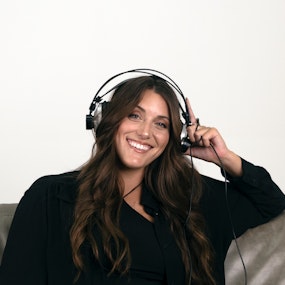
Chelsea Riffe
CEO
Chelsea Riffe is an industry-renowned Podcast Coach, helping creatives, coaches, and entrepreneurs launch, grow and monetize their podcasts. She blends her 10+ years of digital media, content marketing, and storytelling expertise to find the golden ticket strategy for her clients.
She's also a full-time digital nomad and hosts the top-rated podcast "In My Non-Expert Opinion", covering the rollercoaster of entrepreneurship, the fun and chaos of travel, internet culture, and the mindset B.S. we all go through. The podcast has garnered over 150k+ downloads and continues to grow each week.
You can catch Chelsea on a flight, working at a local cafe, or running her podcast weekly!




























